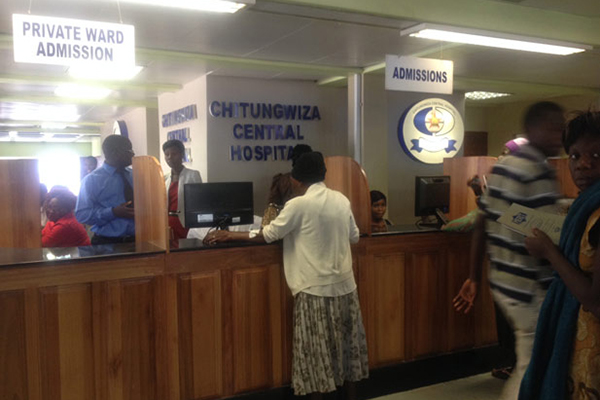
CHITUNGWIZA Central Hospital which, for decades, has been the citadel for the underprivileged people of the populous town, has just been converted into a monster, at least according to residents, now biting the very people whose lives it should be saving.
Of the numerous medical facilities in the town, Chitungwiza Hospital cut a sole figure as it identified with the downtrodden man in the street. It connected with the orphan, the widow, the handicapped and all the vulnerable groups bearing the brunt of the brutal economic climate.
The hospital, located about 30 kilometres southwest of Harare, has been a spring of comfort to thousands of residents over the years. However, recent developments at the hospital threaten the welfare of residents. Chitungwiza Central Hospital has embarked on a massive drive to privatise most of its departments to the extent that those who were previously cushioned from astronomical medical costs, in terms of health policy, have now been left out in the open.
It is now doubtful if the facility can be described in the language of a State hospital anymore. The central hospital is slowly morphing into an expensive private medical facility. It has, up to date, privatised its pharmacy, laboratory, mortuary and radiology departments. The mortuary, for instance, is now being run by Doves Funeral Services, while the radiology department is now under the Baines Group. Ward three is currently under renovations so as to be privatised and plans to privatise the laundry department are at an advanced stage. In fact, patients from ward three have been moved to an observation ward.
Now, these developments mean different things to different people. To groups such as the Baines Group and Doves Funeral Services, this certainly translates to the incoming of the elusive United States dollar, it is business.However, to the poor resident of Chitungwiza, this certainly is sad news as it translates to difficulty in accessing primary health care. It means a step closer to death.
What is worse, as residents have complained, is that the privatisation of departments has been carried out without the necessary consultation with critical stakeholders. It is being done without the input of the people directly affected by the move and this means, for example, children below five years and the elderly above 65, who, in terms of the health policy, should be exempted from paying for medical provisions, are now required to pay for such primary health care.

This has justifiably courted the ire of Chitungwiza residents who have taken great exception to the exercise; residents have condemned the privatisation exercise. The Chitungwiza Residents’ Trust (CHITREST) has come out guns blazing, condemning the privatisation largely because “relevant stakeholders have been left out of the process”. Recently, in a Press statement, CHITREST said: “The privatisation drive is against the five basic human rights, namely health-care, water, education, food and shelter.” Even ordinary residents in Chitungwiza cannot make head and tail of the development. “We do not even have a clue as to why they are doing this, especially in light of the tough economic environment. You wonder if their goal is to fix the poor,” said one resident.While to the various partners contracted by the hospital, it’s good business, to the resident of Chitungwiza it’s a drain on their already overburdened pockets.
- Chamisa under fire over US$120K donation
- Mavhunga puts DeMbare into Chibuku quarterfinals
- Pension funds bet on Cabora Bassa oilfields
- Councils defy govt fire tender directive
Keep Reading
It would appear the negatives arising from the drive far outweigh the positives. Most of the medical personnel at the central hospital are now earning less than some non-medical staff employed by private entities, for example, cleaning and office orderly staff. Palpably, this has a serious impact on the morale of medical staff and immensely diminishes their zeal to professionally render services to patients.
Apart from limiting access to health-care for the poor, the privatisation drive is clearly out of place in a high-density suburb like Chitungwiza, where incomes hardly suffice. CHITREST, in this regard, may be right to argue that the move chokes the common man in the street. How else does one justify that a 74-year-old widow has to fork out hundreds of dollars for medical tests and drugs? Section 76 (1) of the Constitution of Zimbabwe gives every citizen or permanent resident the right to basic health care services, including reproductive health care services.
Under the current tough economic environment, citizens are already battling to meet medical bills and to access medical services from private providers, whose driving motive is maximising on profits as compared to considering the needs of the vulnerable members of society. While public hospitals provided the poor with a shoulder to lean on, such a drive as the one currently underway at Chitungwiza Central Hospital, puts the poor between a rock and hard place, they have nowhere to run to.
We read daily reports that medical aid providers are failing to pay service providers and it befuddles the mind to think of how the underprivileged can fund these privatised health services. Certainly, the poor man feels the heat.
While there is no problem with a public hospital forming partnerships in the health-care sector, it is incumbent upon authorities to thoroughly check whether their efforts are constructive and in sync with the constitutional mandate to ensure equal access to medical care for all, particularly with the poor in mind.
lLearnmore Zuze is a legal researcher, author and media analyst. He writes here in his own capacity. E-mail:[email protected]











